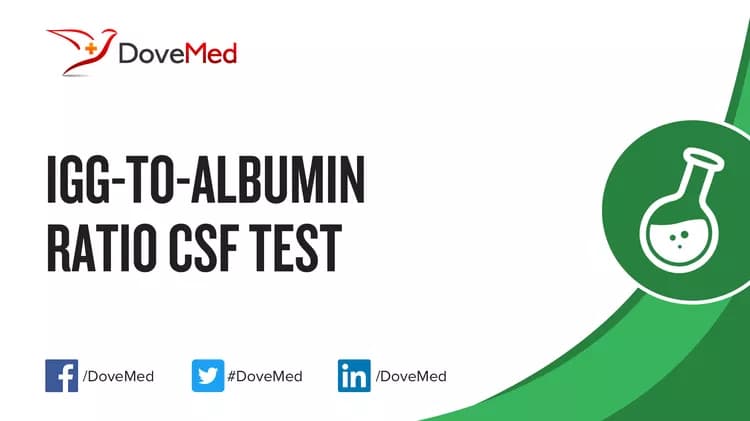What are other Names for this Test? (Equivalent Terms)
- IgG/Albumin Ratio, CSF Test
- Immunoglobulin G and Albumin, Cerebrospinal Fluid Test
- Immunoglobulin G/Albumin Ratio, Cerebrospinal Fluid Test
What is IgG-to-Albumin Ratio CSF Test? (Background Information)
- IgG-to-albumin is a comparison of the levels of IgG to the levels of albumin in the cerebrospinal fluid (CSF). It is used to aid in the diagnosis of multiple sclerosis (MS)
- IgG is a type of antibody produced by B cells of the immune system. Normally, IgG levels increase after an infection, as the body builds immunity to the pathogen
- However, raised IgG levels in the CSF are associated with multiple sclerosis, a disorder that occurs when the immune system attacks the protective covering of the nerves
- It is important to differentiate between IgG that is produced in the CSF and IgG made in the blood that leaks into the CSF
- The IgG-to-Albumin Ratio CSF Test compares the levels of IgG to the levels of albumin (a common carrier protein) in the cerebrospinal fluid. This may be then compared to the IgG-to-albumin ratio in blood
- A high IgG-to-albumin ratio in the CSF means there is an abundance of antibodies in the CSF relative to other proteins. This may be caused by increased antibody production in the CSF, which may be due to multiple sclerosis
- Or, a high IgG-to-albumin ratio in CSF may be caused by leakage of IgG into the CSF from the blood. To determine if this is the case, an IgG-to-Albumin Ratio Blood Test may be performed and compared to the value for the IgG-to-Albumin CSF Test value
- If the IgG-to-Albumin Blood test value is lower in blood than in the CSF, then IgG is being produced mainly in the CSF. If the test value is higher, IgG is entering the CSF from blood
What are the Clinical Indications for performing the IgG-to-Albumin Ratio CSF Test?
Following are the clinical indications for performing the IgG-to-Albumin Ratio CSF Test:
- Slurred speech
- Blurred vision
- Mood swings
- Excessive urination
- Cramping
- Fatigue
How is the Specimen Collected for IgG-to-Albumin Ratio CSF Test?
Following is the specimen collection process for IgG-to-Albumin Ratio CSF Test:
Sample required: Cerebrospinal fluid (CSF)
Process of obtaining a cerebrospinal fluid sample in adults:
- The skull or lower back is cleaned with 70% alcohol in an outward spiral, away from the zone of needle insertion
- A thick needle is inserted into the site, and the necessary amount of CSF is drawn out
Preparation required: No special preparation is needed prior to the test.
What is the Significance of the IgG-to-Albumin Ratio CSF Test Result?
A high value (greater than 0.25) for the IgG-to-Albumin Ratio CSF Test may indicate:
- Multiple sclerosis
- Cerebral or cerebellar atrophy
- Amyotrophic sclerosis
- Brain tumor
The laboratory test results are NOT to be interpreted as results of a "stand-alone" test. The test results have to be interpreted after correlating with suitable clinical findings and additional supplemental tests/information. Your healthcare providers will explain the meaning of your tests results, based on the overall clinical scenario.
Additional and Relevant Useful Information:
Certain medications that you may be currently taking may influence the outcome of the test. Hence, it is important to inform your healthcare provider of the complete list of medications (including any herbal supplements) you are currently taking. This will help the healthcare provider interpret your test results more accurately and avoid unnecessary chances of a misdiagnosis.
The following DoveMed website link is a useful resource for additional information:
http://www.dovemed.com/diseases-conditions/multiple-sclerosis-ms/
Please visit our Laboratory Procedures Center for more physician-approved health information:
http://www.dovemed.com/common-procedures/procedures-laboratory/
Related Articles
Test Your Knowledge
Asked by users
Related Centers
Related Specialties
Related Physicians
Related Procedures
Related Resources
Join DoveHubs
and connect with fellow professionals


0 Comments
Please log in to post a comment.